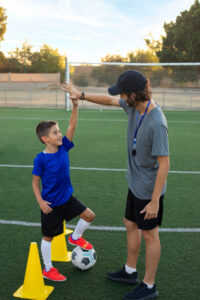Dyslexia Strengths within Sport
Despite the challenges, dyslexic footballers possess a range of strengths that can make them stand out on the field:

- Exceptional Spatial Awareness – Dyslexic individuals often excel in spatial reasoning, which is a critical skill in football. They can read the field, anticipate opponents’ movements, and position themselves strategically during play. This heightened sense of space and positioning allows dyslexic players to have a natural feel for the game, making them exceptional in roles such as quarterbacks, defenders, or wide receivers.
- Creative Problem-Solving – Football is unpredictable, and dyslexic players’ ability to think outside the box and find creative solutions to on-field problems can be a major advantage. Their unconventional thinking enables them to make quick, intuitive decisions when a play doesn’t unfold as planned, often leading to unexpected but successful outcomes.
- Adaptability Under Pressure – Dyslexic athletes are used to overcoming obstacles in everyday life, which builds resilience and adaptability. On the football field, this translates into the ability to remain calm under pressure and adjust to rapidly changing situations. Dyslexic players tend to be quick on their feet, able to shift strategies mid-play and find ways to contribute even when things aren’t going according to plan.
- Enhanced Visual Learning – While reading and verbal instructions may pose a challenge, many dyslexic players excel at learning visually. They can pick up new skills, strategies, and formations by watching video footage or observing teammates. This ability to learn by seeing helps them grasp complex plays and develop muscle memory, making them highly coachable athletes.
Many dyslexic individuals make great leaders and organisers. They tend to think outside the box and are very creative, which gives them a huge advantage over the opposition. They tend to be observant, which could make them more alert to opponents intentions, and are very good at problem solving. Like with dyspraxia, they tend to be quite empathetic, which could make them good communicators. They are usually very good at joining the dots and can piece together quicker than others what is happening around them. They are often enthusiastic and energetic, which can bring a lot of positivity to the workplace or club. They tend to be very good at understanding practical tasks and often have a hands-on approach. The verbal communication can often be really good, and therefore could lend themselves to be a good team leader. They are often very resilient and determined. They are often very resilient and determined and are often big-picture thinkers.